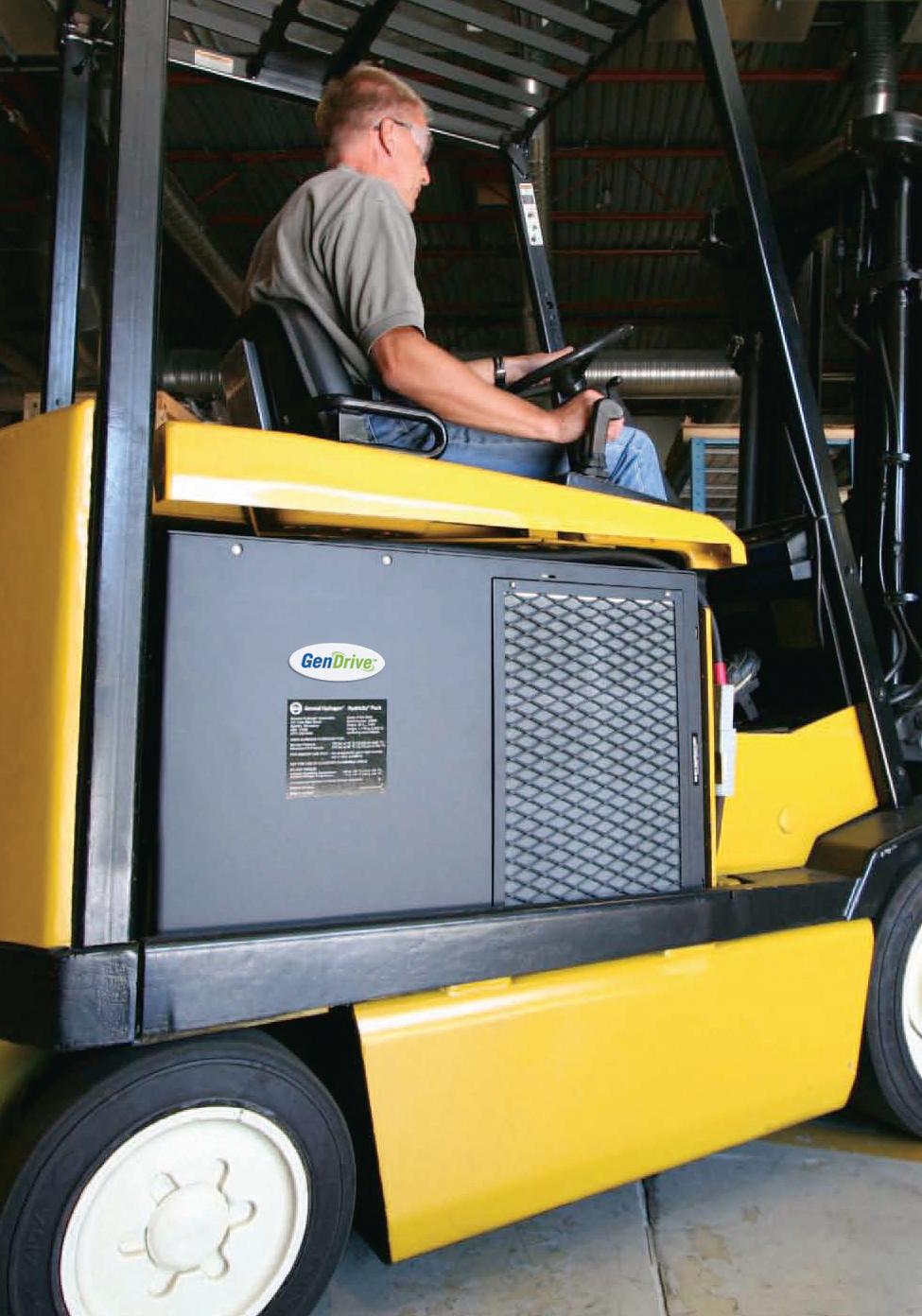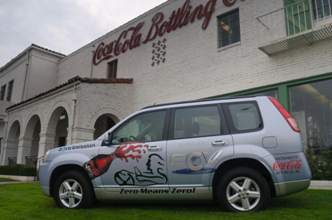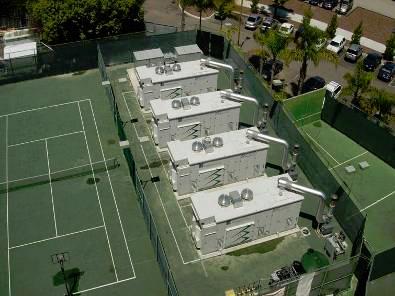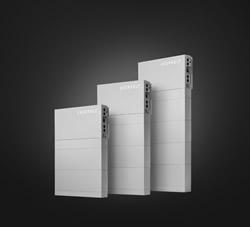A new report from Fuel Cells 2000, "The Business Case for Fuel Cells: Why Top Companies are Purchasing Fuel Cells Today", highlights 38 nationally recognized companies that are installing fuel cells.
Supporting Fuel Cells Is Easy- Doing The Things You Already Do
Elizabeth Delmont | Fuel Cells 2000
Relax and have a beverage
Nestlé Waters replaced an entire fleet of electric lift trucks with fuel cells from Plug Power at its bottling facility in Dallas, Texas. The fuel cells increase productivity at the plant, because they take less time to refill when compared to recharging batteries.

Plug Power - Nestle Waters
Coca-Cola Enterprises is generating 30 percent of the energy used at its Elmsford, New York production facility with two UTC Power fuel cells, as well as outfitting a production facility in Charlotte, North Carolina, with 40 fuel cell powered forklifts by the end of the year. Also, if you like Coke Zero, they are promoting the beverage with a Nissan X-Terra Fuel Cell Vehicle. Zero emissions for Coke Zero! Sierra Nevada Brewery has installed 1.2 MW of fuel cells from FuelCell Energy at its brewery in Chico, California.

The waste from the brewing process is fed through an anaerobic digester, and the gas powers the fuel cells, making for a very green energy process.
Grab a snack
Pepperidge Farms installed its first fuel cell system in 2006. They liked it so much that in 2008 the system was expanded to over 1.4 MW. The FuelCell Energy system generates over 70 percent of the energy needs for the Bloomfield, Connecticut, bakery. So far, the company has reduced carbon dioxide emissions by 11.4 million pounds!
Send a care package
Send someone you love a care package; both FedEx and UPS are using fuel cells in their operations. FedEx is deploying 35 fuel cells as battery replacements for lift trucks at the Springfield, Missouri, service center. At the Oakland, California, service hub, the company has installed a Bloom Energy Server to provide 500 kW of power, and is reducing carbon emissions by 30 percent. UPS was involved in testing the Bloom Energy Servers, at the Anchorage, Alaska, distribution facility. In 2004 two fuel cell-powered delivery vans entered into service, one in Long Beach, California, and the other in Ann Arbor, Michigan.
Do your grocery shopping
The grocery industry is embracing fuel cells for stationary power generation and materials handling vehicles. Central Grocers is deploying 220 fuel cell powered pallet trucks at a distribution center in Joliet, Illinois and in San Antonio, Texas, H-E-B has 14 fuel cell-powered reach trucks at its distribution center. Price Chopper, is using a 400-kW fuel cell from UTC Power to provide reliable power to a store in Colonie, New York, and the company anticipates installing fuel cells at other stores in the future. Live in New England? Shaws/Star Market has installed a fuel cell at its store in Chestnut Hill, Massachusetts, reducing carbon emissions by nearly 5 million pounds. Safeway has installed fuel cells its LEED certified store in Santa Cruz, California. Wegmans has converted a whole fleet of trucks at the Pottsville, Pennsylvania, warehouse to fuel cells, increasing productivity, and the carbon emission reductions is the same as taking 134 cars off the road. Whole Foods Markets is utilizing fuel cells up and down the east coast. Their store in Glastonbury, Connecticut, was the first supermarket in the world to generate most of its power from a fuel cell. The new store in Dedham, Massachusetts, also receives most of its power from fuel cells, and a store in San Jose, California, will be outfitted with fuel cells as well. At its warehouse in Landover, Maryland, Whole Foods is operating 61 fuel cell powered forklifts.
Talk on the phone
Telecommunications companies are increasingly turning to fuel cells to provide critical backup power to cell phone towers. Sprint Nextel has installed over 250 fuel cells across the U.S., with more planned. Verizon has installed fuel cells for critical power at a major call routing facility in Garden City, New York. The company is also testing fuel cells at switching stations across the country.
Take a vacation
Hotels are installing fuel cells for stationary combined heat-and-power. The waste heat from the fuel cells can be captured to heat the buildings, provide hot water for the rooms, swimming pools, laundry services, or run through an absorption chiller to provide air conditioning. Hilton Hotels installed fuel cells in their Manhattan, New York, hotel back in 2007. The fuel cell reduces the hotel’s carbon footprint by approximately 760 tons per year, according to the fuel cell manufacturer, UTC Power. Starwood Resorts and Hotels is installing fuel cells in their Sheraton and Westin brands. The Sheraton New York was the first hotel in Manhattan to use fuel cells. The company also has fuel cells installed at hotels in Edison and Parsippany, New Jersey. The Sheraton, San Diego, has installed 1.5 MW of fuel cells since 2005, and the quiet system is installed next to the tennis courts.

At the Westin San Francisco Airport Hotel, fuel cells provide nearly 100 percent of the hotels energy needs, and the waste heat is used to warm the swimming pool.
Go shopping
Retailers are beginning to realize that fuel cells can be a great way to provide electricity to the store, and also provide critical backup power in case of grid failure. Cabelas, an outdoor specialty retailer, is using fuel cells at their store in East Hartford, Connecticut. The fuel cells provide power at a rate lower than the electrical grid, saving the company money on their utility bill. Additionally, the company says it saves 1,800 tons of carbon emissions each year. Staples has installed fuel cells at a distribution center in Ontario, California, saving 2.5 million pounds of carbon dioxide in its first year of operation, according to the manufacturer. Walmart has replaced battery powered forklifts with fuel cells at a distribution center in Washington Court House, Ohio. Additionally, Walmart has installed stationary fuel cells at two stores in southern California.
To learn about what other top companies are utilizing fuel cells in their operations, download the free report.
The content & opinions in this article are the author’s and do not necessarily represent the views of AltEnergyMag
Comments (0)
This post does not have any comments. Be the first to leave a comment below.
Featured Product

EVERVOLT home battery storage: Dependable power, with or without solar
Whether paired with solar or used independently, the renewable energy stored in an EVERVOLT home battery system serves as a reliable backup against unpredictable utility grid fluctuations and weather-related events. Keep essential appliances running longer and maintain your lifestyle during unforeseen circumstances. Our EVERVOLT battery storage systems are backed by a comprehensive 12-year warranty from Panasonic, including coverage for labor. Learn More about Panasonic EVERVOLT.
